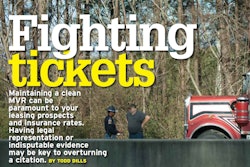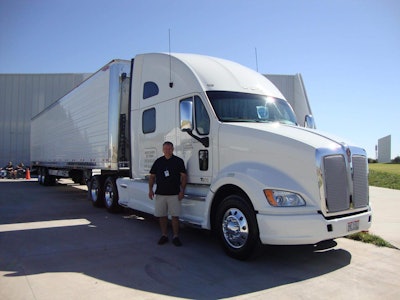 When hauling for “American Idol,” Landstar owner-operator Tom Arnold used his own trailer equipped with a liftgate and other equipment so he could unload anywhere without a dock.
When hauling for “American Idol,” Landstar owner-operator Tom Arnold used his own trailer equipped with a liftgate and other equipment so he could unload anywhere without a dock.Entertainment hauling covers concert tours, theater performances, sporting events and more. Some events only require the driver to bobtail to a venue, hook to a trailer and take it to the next venue without ever touching the freight. Other events require the driver to help load and unload.
One thing that’s common with most event hauling, though, is higher pay.
“They don’t pay you those rates just because they like you,” says Landstar owner-operator Gary Buchs. What merits more money is experience, responsibility, flexibility and the commitment to weeks or months on a tour.
There also can be benefits beyond pay. “Catering, seeing a show, things like that,” says owner-operator Steve Mesh of Chelsea, Vermont, leased to Stage Call Specialized Transportation. At the same time, drivers shouldn’t expect special perks. “It’s best for drivers to be seen and not heard,” he says.
Because the miles per day averaged over a tour’s length are relatively low, drivers usually get paid a flat rate. Landstar owner-operator Tom Arnold, who hauled for “American Idol” audition tours from 2011 to 2015, says his weekly pay was more like a salary.
The tours lasted as long as three-and-a-half months or as short as seven weeks. Arnold averaged 500 to 700 miles between venues.

“Some weeks, we would stay in the same city and just move to a different venue, so those weeks were great,” he says. “We got paid the same for doing less work. But one time, we had to get from Los Angeles to Boston in four days. We did it legally, but we had to push the limit.”
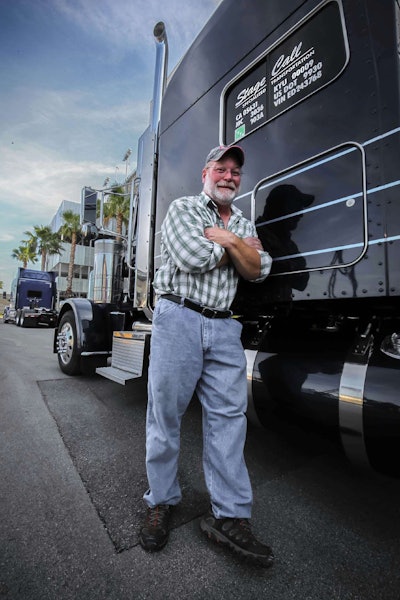 Steve Mesh, leased to Stage Call Specialized Transportation for 20 years, has hauled concert tours, corporate tours, sporting events and more.
Steve Mesh, leased to Stage Call Specialized Transportation for 20 years, has hauled concert tours, corporate tours, sporting events and more.Buchs picks up loads a couple of times each month for off-Broadway theater shows in the Midwest. He says the pay, when computed on a mileage basis, is about two to three times the rate of general freight, but it’s well earned.
“You can spend 30 hours on a 120- mile load,” Buchs says. “There’s a lot of detention time involved, but it’s built into the rate. With the loads I do, I bobtail to a venue and usually have to arrive around 8 or 9 p.m. on a Sunday. The shows don’t end until later, so it’s often midnight or later when I get loaded. When I do those loads, I’m getting paid for my work time, driving time, loading time and everything else.”
Buchs then usually drives through the night to get to the next venue Monday morning. “A lot of owner-operators don’t want to work those kinds of hours,” he says. “You have to plan ahead and manage your hours to stay legal.”
If a delivery is late the next day, the carrier could be required to “buy the house,” which means they would have to pay for all of the tickets to the show and pay the staff and everyone involved. “I can’t imagine what that would cost,” Buchs says.
Because the loads are one-way and Buchs operates as an independent, he has to pay for his unloaded miles getting to the venue and then to his next load after delivering the equipment on Mondays.
Stage Call’s drivers also are paid more like a salary. “Our company trucks only average about 70,000 miles a year,” says J. Watkins, chief operations officer.
The 120-truck concert-hauling fleet pays its drivers by the day because the miles are lower. The day rate averages $390 plus a fuel surcharge. Stage Call owner-operators gross about $170,000 a year. Because they drive fewer miles, they have lower maintenance costs, which usually results in higher net pay than most general freight haulers, Watkins says.
Mesh drives about 80,000 miles annually but says he grosses about the same as drivers hauling general freight and driving 120,000-plus miles a year.
“At the end of the day, I gross about the same, but I keep a little bit more of that because I burn less fuel, I have less wear and tear on the truck, and my loads are generally lighter,” he says.
About 30 percent of Stage Call’s trucking needs are not dedicated touring, but typically are hauls such as moving lighting and sound equipment from a warehouse to a convention center. The company pays these drivers $1.35 per mile plus a fuel surcharge. Arnold has done shows where stage crews loaded and unloaded everything, but his time with “American Idol” was more demanding.
“You have to load it in order so it comes off in order,” he says. “They’re building the set as they’re unloading, so they want the carpet and toolboxes loaded last so they come off the truck first. When the set is built, you have to load the empty boxes back on the truck. Sometimes, as the days go on at a venue, they’re switching things out, so you’re constantly doing things when you’re at a venue.”
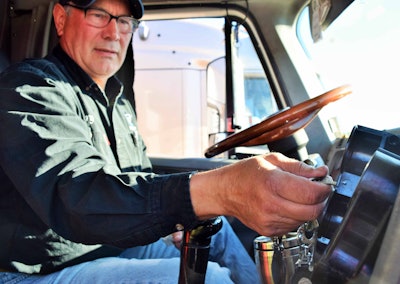 When hauling off-Broadway theater shows, Landstar owner operator Gary Buchs has to arrive at a venue hours before the end of a show to get the load after midnight and onto the next venue.
When hauling off-Broadway theater shows, Landstar owner operator Gary Buchs has to arrive at a venue hours before the end of a show to get the load after midnight and onto the next venue.Hauling the off-Broadway shows, Buchs never touches the freight at loading or unloading. “They secure the loads when they load them out, use winches to get the heavier items on the truck – they do it all,” he says.
Watkins says much of Stage Call’s freight is no-touch for drivers. Union stage hands do most of the lumping, and the drivers are mainly responsible for making sure the freight is secured before traveling.
Mesh, who has been hauling entertainment for 24 years and with Stage Call for 20 years, has been part of tours that were no-touch, others that weren’t.
“When a show ends, the gear rolls out very fast, and it’s important for the driver to know how it all needs to be loaded,” he says. “There isn’t always a manager there to tell the crew what goes where. Repetition leads to perfection.”
Then there are instances when it’s best to step back and just strap things down. Patience, Mesh says, is the key to lasting in entertainment hauling.
“Most of the time, the guys who haul for music tours need to be involved with strapping, barring and calling the load – knowing which cases go where in the trailer,” Mesh says. “It’s like a game of Tetris. As soon as I see my cases coming out, I go grab them and pull them over to separate them so they can be loaded. I’ve seen some drivers not paying attention, and they tend not to last in this business. Guys who get involved and do well get asked to come back. It’s job security.”
With the absolute need for an event to start on time, a company responsible for hauling may use extra protocols to ensure punctuality.
In Buchs’ experience with Clark, beginning on the Friday before a Sunday load, he has to call the company to check in once a day to confirm he can handle the load.
“You better not miss that call,” Buchs says. “If you lose their trust, it’ll be hard to get back in with them.”
Buchs has had requests to be tracked via a smartphone app while on these specialized loads.
“You can’t be paranoid about being tracked or anything like that if you want to haul this type of equipment,” he says. “It’s part of the world we live in. And if they’re paying me that kind of money, they can follow me all day.”
Breaking into the niche
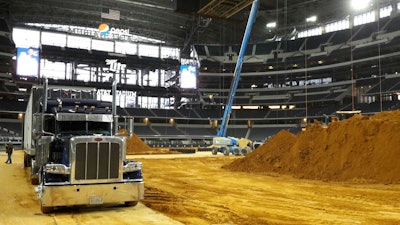 Steve Mesh delivered rodeo equipment to AT&T Stadium in Dallas. After owning a Freightliner FLD, then a Kenworth W900 that he kept for 19 years, he bought this 2014 Peterbilt in 2013.
Steve Mesh delivered rodeo equipment to AT&T Stadium in Dallas. After owning a Freightliner FLD, then a Kenworth W900 that he kept for 19 years, he bought this 2014 Peterbilt in 2013.Getting into hauling for events can be all about who you know. Owner-operator Gary Buchs got into off-Broadway hauling after his Landstar agent got him in contact with Clark Transfer of Harrisburg, Pennsylvania, which hauls shows and other events. Many such loads typically aren’t posted on load boards because of their specialized nature.
Landstar owner-operator Tom Arnold got on with “American Idol” because he had a friend who left the job and helped him fill the empty spot.
“It’s hard to get in without any experience doing shows,” Arnold says. “I had a friend vouch for me. They expect someone with some sort of logistics experience with special commodities, whether that’s moving household or sensitive equipment.”
Stage Call Specialized Transportation looks for drivers with at least two years of over-the-road driving experience, a clean driving record, a stable job history and clean background checks, says J. Watkins, chief operations officer.
When hiring owner-operators, Stage Call requires late-model trucks that are compliant with all of California’s emissions regulations. Watkins says the equipment must be “aesthetically pleasing and mechanically sound.”
“Appearance is important because a lot of people will see our trucks at shows,” he says. “We want our drivers to have relatively low-key trucks with the Stage Call logo prominent.”
Another hurdle can be security clearance. For some of the largest events, such as the Super Bowl, the carrier has to work through the U.S. Department of Homeland Security to get the driver and the truck cleared to be at the stadium, Watkins says.
Most of the drivers Stage Call uses for its tours are either company drivers or owner-operators leased to the company. Stage Call also brokers out freight during the busier seasons, Watkins says.
Steve Mesh, leased to Stage Call, says it’s important for all drivers thinking about hauling concert tours and events to consider extended time away from home. He once was on a tour that lasted 10 months. “Can they handle it, and can their families handle it?”




